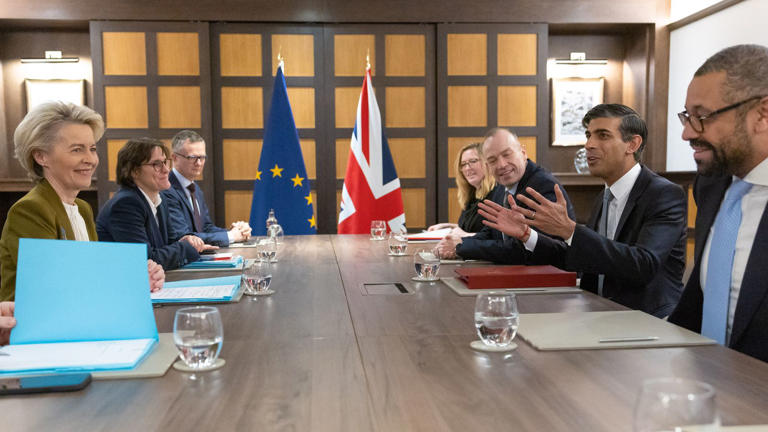
That impasse has bedevilled UK-EU relations and hobbled the power-sharing arrangement in Northern Ireland.
It is the boldest move of his premiership and laden with jeopardy.
Pull it off and this is a beleaguered prime minister very much emboldened.
Fail, and Mr Sunak could see his premiership sinking under the weight of Brexiteer rebellions, a resurgent Boris Johnson and continued tensions in Northern Ireland.
Where it was clear that Mr Sunak had won on Monday was with Brussels.
The bonhomie between the prime minister and the European Commission President Ursula von der Leyen was plain to see.
The PM hailed this as a “new chapter” in EU-UK relations while Ms von der Leyen – perhaps with her old adversary Boris Johnson in mind – claimed they had come out of these negotiations with a “stronger EU and UK relationship” and praised Mr Sunak’s “very constructive attitude from the very beginning to solve problems”.
A new principal, with a new approach, resulted in genuine gains with the EU moving in a way that many thought was not possible.
Mr Sunak won concessions that many Brexit watchers thought was not possible months ago when Mr Johnson conceived the Northern Ireland Protocol Bill in order to unilaterally overwrite the post-Brexit trading arrangements between Northern Ireland and Great Britain (a bill now dropped).
The new deal has a “green lane” with no checks for goods crossing the Irish Sea destined to stay in Northern Ireland, while a “red lane” would be used for goods continuing into Ireland and the EU single market.
The prime minister also said the agreement would end the situation where food made to UK rules could not be sent to and sold in Northern Ireland.
Under the new deal, Northern Ireland would have the same goods, drinks and medicines as the rest of the UK: “We have removed any sense of a border in the Irish Sea.”
It also re-writes part of the existing protocol to allow Westminster to set VAT rates in Northern Ireland.
The deal also sought to tackle the “democratic deficit” which has so vexed unionists who will not countenance being treated differently to the rest of the United Kingdom and which has resulted in the suspension of the power-sharing assembly in Northern Ireland.
On Monday, the PM unveiled the “Stormont brake” which sought to address the issue of Northern Ireland being subject to EU goods laws.
Under a new arrangement, the Stormont assembly will be allowed to oppose new rules if a total of 30 members from at least two parties decide to activate the brake.
Mr Sunak said it was a “powerful new safeguard based on cross-community consent”.
The question is whether the cross-community vote, requiring a majority of unionists and Irish nationalists, rather than a straightforward majority vote, will be enough to satisfy the DUP.
And while the PM told MPs that the deal removed 1,700 pages of EU law and “puts beyond all doubt that we have now taken back control”, officials conceded too that the Windsor Framework doesn’t remove EU law or European court jurisdiction from Northern Ireland.





















